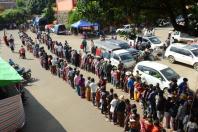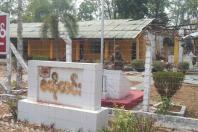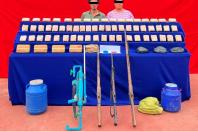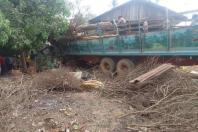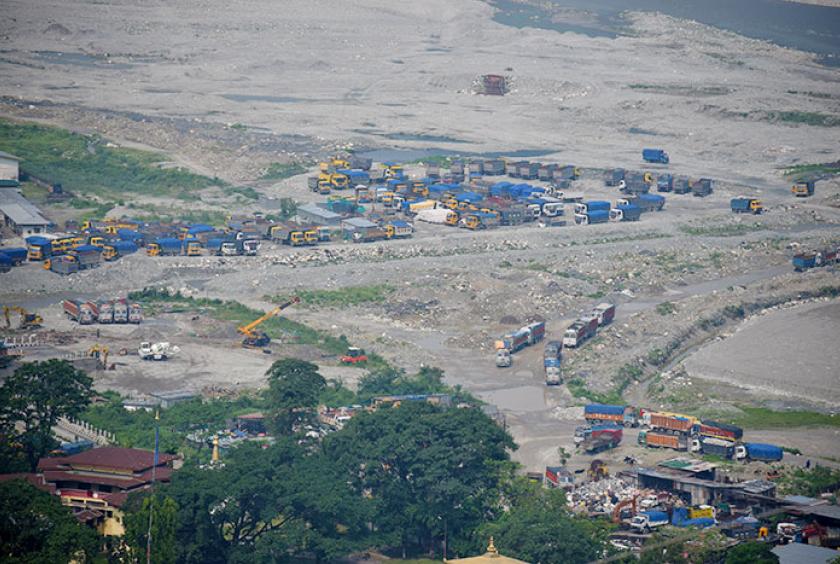
Thimphu (Kuensel) - Strict implementation of carrying capacity rule from May 17 evening in Phuentsholing has decreased vehicle movement drastically.
Traffic police and the Road Safety and Transport Authority (RSTA) enforced the rule from May 17 evening.
Overloaded trucks are not allowed to either enter or exit Bhutan, leaving hundreds of trucks stranded in Phuentsholing and the border town Jaigaon.
The permissible load capacity is determined from the registration certificate (the blue book) and varies by the types of trucks.
The Anti-Corruption Commission (ACC) recently asked relevant authorities to strictly implement the carrying capacity rule as per Section 68 of the RSTA Act, 1999. Section 68 says: “A person must not drive or allow a motor vehicle to be driven on a highway if the vehicle is carrying a load which is in excess of the manufacturers’ specifications (overloaded) for that type of vehicle or it exceeds the gross vehicle weight for the vehicle.”
Although the rule was enforced due to ACC’s ongoing investigation on the export of boulders, the RSTA Act is applicable to all vehicles in the country.
However, should the enforcement of this rule continue, there would be an adverse impact on the overall economy, according to the business community in Phuentsholing.
They pointed out that hydropower, ferrosilicon and cement industries, construction, banks, and retail businesses would all be affected.
Requesting anonymity, a businessman said that heavy machinery of hydropower projects would not be allowed if the rule were to be strictly followed.
“It will affect the already delayed projects,” he said.
The businessman also said that transportation of excavators would stop and have an impact on the construction sector. An excavator is more than 23 metric tonnes (MT) and is always transported overloaded. Excavators are also not allowed to ply on blacktopped roads.
According to the business community, transportation cost for the industrial estate in Paskaha, Samdrupjongkhar, Samtse, and Gelephu would shoot for both import (raw materials) and export (finished products). Ferrosilicon industries today use Indian trucks for both import of raw materials and export. It would be costly to transship from Jaigaon, industrialists say.
Given the long distance between the industrial estates and the source of raw materials in India, Bhutanese trucks are not feasible, industrialists say.
The figures are yet to be confirmed but sources say that about 2,000 trucks have hit the market since the boulders business started in 2017. Most have availed loans from banks. One of the banks in Phuentsholing has given loans for more than 200 trucks in the last two years.
A truck owner pays at least Nu 35,000 to 40,000 to the banks in a month and more than Nu 15,000 to drivers.
A representative from the truckers association, Tshewang Rinzin said that both drivers and truck owners would lose earnings.
“Banks would also lose,” he said.
Third country import containers arriving at the customs office in Phuentsholing are also overloaded. The sealed containers are opened only once they enter Bhutan. Transshipment is not allowed.
Even if transhipments were allowed, the transportation cost is expected to shoot, which would again inflate the price of goods for consumers.
Transportation cost for groceries sent to Thimphu has already increased, according to wholesale distributors.
A businessman in Thimphu, Sonam Tshering, who transports commodities, said the transportation cost has already increased to more than Nu 2,000 from Nu 1,500 a MT after the carrying capacity rule was implemented.
“At the end I will increase the price of the commodity at my shop and it would affect the consumers,” he said.
Another grocery distributor based in Thimphu and Phuentsholing, asking anonymity said that the transportation cost of ferrying groceries to the capital from Phuentsholing has jumped by 25 percent.
“It is okay for a short term and I can run in loss for about a month,” he said, explaining he will have to increase the price after that. “I will have to sell above the MRP rate.”
A 25 percent increase on a particular commodity would not make much price difference but if more than 60 truckloads of commodities his shop imports are considered, there would be huge difference, and the consumers would suffer at the end, the distributor said.
Most Bhutanese use DCM and Jumbo trucks for transportation of groceries. A DCM’s actual carrying capacity is just five metric tonnes (MT) but carries about seven to eight MT. A Jumbo’s load capacity is eight MT but carries about 12-14MT.
The general manager of business department with the Food Corporation of Bhutan Limited (FCBL), Dorji Tashi also said that about five trucks carrying essential commodities had to return from the gate. Most trucks carry more than 20MT, he said.
“Some trucks are already on the road,” he said, adding that the ad-hoc implementation had disrupted the flow.
Dorji Tashi said the number of trucks has to be increased for transshipment, including loading and unloading charges, which would add up to the cost. The cost would eventually be passed on to the consumers.
“A time of at least a week should have been considered for preparation and better implementation,” he said.
Meanwhile, more than 200 trucks loaded with boulders are stranded at several areas in Phuentsholing while hundreds of trucks into the business remain idle.
Truckers association’s Tshewang Rinzin said the trucks were loaded before the implementation of the carrying capacity rule on May 17 evening.
“We have declared and paid the necessary bills, which have become invalid now,” he said. “It was implemented suddenly and has affected us badly.”
Although it is good that such rule is implemented strictly, Tshewang Rinzin said that the authorities should at least let these trucks loaded prior to the implementation of the rule exit the gate.
Sources also say more than 300 trucks headed to Bhutan are waiting in Jaigaon.
http://www.kuenselonline.com/load-restriction-rule-heavy-on-the-economy/

